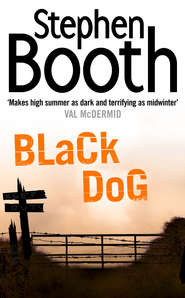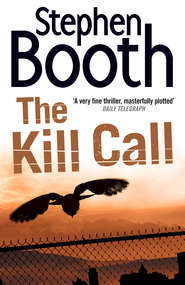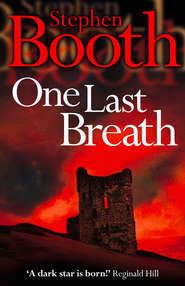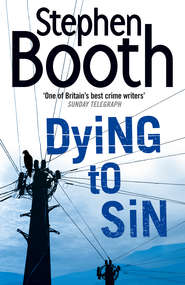По всем вопросам обращайтесь на: info@litportal.ru
(©) 2003-2024.
✖
Scared to Live
Автор
Год написания книги
2019
Настройки чтения
Размер шрифта
Высота строк
Поля
But Myers was crouching closer to the body, and he could see the circular hole punched neatly through the cotton near Rose Shepherd’s heart.
‘Bloody hell, Phil,’ he said. ‘The old bird’s been shot.’
5 (#u85de6a30-c750-5369-ab1c-8f2eeb654e00)
Ben Cooper drove out of the Somerfield’s car park before the plastic crime session was over. He wasn’t sorry to be leaving. He didn’t think Steve Judson would be sorry to lose him, either. Two calls on his mobile were two too many.
As he accelerated his Toyota into Fargate and crossed the junction towards Chesterfield Road, Cooper considered phoning Diane Fry to let her know where he was heading. But if she hadn’t heard about the Foxlow incident already, she’d find out soon enough.
But, wait … a triple death, she’d said, in a house fire. If that turned out to be malicious intent, E Division would have its work cut out. Caseloads were always a headache when a major enquiry cropped up. There were only eighteen DCs on the division, most of them scattered across the sections. Every officer in Derbyshire Constabulary had an average of three crimes on his desk at any one time – well, except in Glossop section, where they claimed to have five. But then, Glossop always had been a world of its own.
Oh well, it looked as though his social life might be put on hold again. And just when it was getting more interesting.
He crossed the bridge over the River Eden and hit the A623 into Calver. To the west, beyond Abney Moor, was his old home, Bridge End Farm. The town of Bakewell was a little further on, and then it was a straight run down the A6 to Matlock.
This was one of his favourite parts of the Peak District, because it seemed to have the best of both worlds. The high gritstone edges rose to the east – Curbar Edge and Baslow Edge. Dark, bare and ancient. But down here in the valleys, the dense woodland gave the landscape an entirely different character. At this time of year, he could start to think of it as his own world again, almost free of tourists, settling under its blanket of fallen leaves.
And beneath the trees, among the fields and the drystone walls, were the small farms. Each one, like Bridge End, trying to face up to its future.
Finally, he reached Foxlow. It was one of those villages that looked as though nothing ever happened, but where the worst things often did. Not much traffic during the day, and no one out on the street. The residents were all at work, or in their gardens, or shut away in their front rooms, wondering what all the activity was outside.
The scene at Bain House was already swarming with personnel and vehicles. When Cooper reported to the RV point, he was amazed to see officers from the Firearms Support Unit patrolling the outer cordon with their automatic weapons cradled across their bullet-proof vests. That could only mean one thing.
His DI, Paul Hitchens, was coming across the garden with the crime-scene manager, Wayne Abbott. Hitchens was dressed in a dark suit and tie, keeping up his image as one of the smartest detectives in E Division. Abbott was wearing his pale blue crime-scene coverall, and neither the colour nor the shapeless outfit suited his muscular build and stubbled jaw.
Waiting patiently for them at the incident control unit was the divisional head of CID, Detective Chief Inspector Oliver Kessen. Until potential forensic evidence had been preserved and recorded, the scene was Wayne Abbott’s domain, and crime-scene managers were jealous gods. Everyone had to wait for his permission to enter.
It was somehow reassuring to see Kessen at a crime scene, though it indicated the seriousness of the incident. Although he wasn’t a big man, the DCI had the ability to become a focal point for activity wherever he happened to be. He was the still centre at the heart of events that might otherwise descend into chaos. Today he looked as calm as ever, using his mobile phone to deal with some administrative problem at the office as he waited for Hitchens and Abbott to reach him.
Cooper admired that. Better to be calm and unhurried than to rush around doing all the wrong things in the early stages. It was the way he’d like to be himself, if he ever made it to a senior level. But he wasn’t sure he had the right temperament. Maybe that was why he was still a DC.
He joined the fringes of the group, hoping for more information. The details he had so far were scanty. A woman found dead in her home, possible signs of an intruder.
The DCI took his time ending his call. ‘Definitely a shooting?’ he said finally, turning his gaze on Abbott.
Abbott pulled the hood and collar of his scene suit away from his neck and peeled off his gloves. ‘Absolutely. At least three shots were fired, I’d say.’
‘Why would you say that, Wayne?’
‘You can see for yourself. We’ve got the video, of course. But I can let you do a walkthrough on this one, if you like.’
The DI was signalling. Cooper fell in step alongside him as they headed towards the house.
‘The victim’s name is Rose Ann Shepherd. Unmarried, so far as we can tell. It appears she lived completely alone – no other family members, and no staff. She’s been resident in the village for about ten months.’
‘Who found her?’ asked Cooper, pulling out his notebook.
‘Well, a neighbouring farmer raised the alarm, but it was actually the postman who first noticed something wrong – his name’s Bernie Wilding. Mr Wilding could see that the victim hadn’t emptied her letter box.’
‘So she’s been dead since yesterday?’
‘At least.’
They followed the path marked out for them to climb the stairs and reach the master bedroom. The victim’s body still lay where PC Myers had found it, half on and half off the rug, twisted at an unnatural angle. She looked as though she’d been turning towards the door, one arm outstretched, but bent awkwardly by the fall. The red stains on the sheepskin ran on to the carpet and soaked the victim’s nightdress. Cooper noticed that the nightdress was blue, only a shade or two darker than Abbott’s crime-scene suit.
The bedroom was noticeably cooler than the rest of the house. And there was an obvious reason for that – the casement window stood open. A cool breeze blew through the back garden of Bain House, and a few dead leaves had drifted on to the window ledge.
‘So,’ said Kessen. ‘Three shots, you said?’
Abbott stood over the body. ‘Well, two shots hit the victim. The medical examiner says either one of them might have been enough to kill her. Certainly enough to put her on the floor.’
‘So where did the third shot go?’
‘That was a miss. The bullet embedded itself in the bedroom wall there, high up near the ceiling. See it?’
‘Yes.’
‘We’ll be able to give you an idea of the weapon once the bullets have been recovered.’
‘Time of death?’ said Kessen, without much sign of optimism.
‘Between thirty and forty hours ago, according to the ME. Rigor mortis was almost gone when he examined the victim, but for a bit of residual stiffness in the abdomen.’
‘My God, forty hours?’
‘At the maximum.’
Hitchens looked at his watch. ‘That would put the earliest time of the incident at nine p.m. Saturday. And the latest at seven a.m. Sunday.’
Kessen shook his head. ‘For heaven’s sake, how does a woman get herself shot and then lie dead for nearly two days without anyone noticing? Why didn’t someone somewhere miss her? Why didn’t they get worried when she wasn’t out and about doing all the things she usually did?’
‘The time is just a temperature-based estimate, of course,’ said Abbott. ‘You’ll need some other evidence to pin it down more closely.’
‘Yes, thank you.’
‘Well, temperature-based methods of calculating time of death are the most prone to error, you know. Newton’s Law of Cooling isn’t the most modern approach.’
Ah, Newton’s Law of Cooling. It was a familiar phrase, one that had stuck in Cooper’s mind from his training. When he first heard of it, he’d pictured some seventeenth-century eccentric sitting under a tree with an apple bouncing off his head. He didn’t know the mathematics behind Isaac Newton’s theory, but he knew it was almost always inaccurate – hence the medical examiners hedging their bets and stretching out time scales like Play-Doh.
Like everyone else, he’d been taught that rigor mortis in a dead body was complete by twelve hours and gone by thirty-six. But later he’d discovered that there were as many differences of opinion as there were experts, and too many factors involved. Time of death should be based on witness reports, not physical evidence. But he hadn’t heard a hint of any witnesses yet.
‘Surely we can send FSU home?’ said Hitchens. ‘Whoever did the shooting will be long gone.’
‘Not until we’ve completed a sweep of the area and done door-to-door in the village,’ said Kessen. ‘For all we know, he might be holed up somewhere nearby.’
‘Yes, understood. It just seems to be making the residents a bit jittery, seeing armed police officers on the street. They’re not used to it around here.’
Kessen shrugged. ‘Point of entry, Wayne?’ he said. ‘On the face of it, this open window looks like the way the assailant came into the house.’











